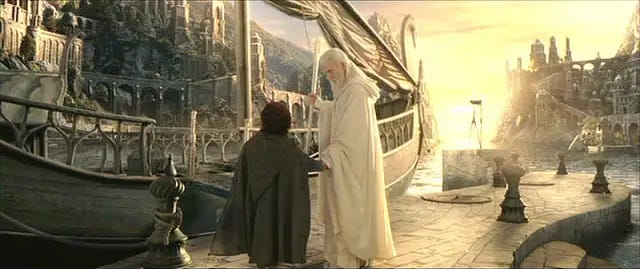The Cost of Saving the Shire
Thoughts on Frodo's Journey from "The Shadow of the Past" and "The Grey Havens"
Hello friends,
It’s here! The first three episodes of The Rings of Power drop this Thursday, so I’ll be writing about that in the weekly newsletter that’ll be hitting your inboxes Friday morning. For even more Rings of Power discussion (or just to hang out with some fellow Tolkien fans), be sure to join the Discord too! (We’re closing in on 100 members!)
In the meantime, here’s the first of a few bonus Tuesday posts over the next few weeks while the main newsletter is focused on RoP.
The Cost of Saving the Shire
I'm reading through The Fellowship of the Ring again
and was struck by the resonance between something Frodo says to Gandalf in Chapter 2, “The Shadow of the Past,” and what he says later on to Sam in “The Grey Havens” chapter of The Return of the King.
Speaking to Gandalf of the quest that lies before him, Frodo shares one of his goals and motivations for taking up the burden and responsibility of the Ring:
I should like to save the Shire, if I could...I feel that as long as the Shire lies behind, safe and comfortable, I shall find wandering more bearable: I shall know that somewhere there is a firm foothold, even if my feet cannot stand there again.
— The Fellowship of the Ring, Book 1, Chapter 2, "The Shadow of the Past"
Immediately this wish called to mind an echo from the final chapters of ROTK. After the Ring has been destroyed and the Hobbits have returned to (and saved) the Shire, they attempt to settle back into their former lives.
Some intuition or insight made Frodo aware all along of the possibility that he might be fighting to save a home he never returns to. But Frodo finds that though he has returned to the Shire, his words to Gandalf were prescient in a way he likely did not anticipate: though his feet were literally able to stand in the Shire again, he finds himself unable to stay there. He has returned home to find it is no longer home.
He explains to Sam:
I have been too deeply hurt, Sam. I tried to save the Shire, and it has been saved, but not for me. It must often be so, Sam, when things are in danger: some one has to give them up, lose them, so that others may keep them."
—Frodo to Sam in The Return of the King Book 6, Chapter 9, "The Grey Havens”
Though the quest to save all of Middle-earth—including the Shire—achieved its end, it cost Frodo everything. Eventually he must leave not just the Shire but Middle-earth entirely, sailing for the white shores of Valinor.1
It must often be so, when things are in danger: some one has to give them up, lose them, so that others may keep them.
Equal parts heartbreaking and heroic, Frodo’s story packs even more punch knowing Tolkien’s own background as a soldier who fought during World War I (notably participating in the Battle of the Somme) and who lost countless friends who fought to save a home they would never again see. Tolkien’s own return journey home doubtless must have impressed upon him how much he had been changed by the war and how much home, even just by the absence of his friends who gave their lives, had also changed.
There are also resonances between Frodo’s journey and the story Tolkien considered the greatest of all fairy-stories: the Gospels.2 Journeying from his home to another Mount of Doom, Golgotha, Christ gives up his life, losing it so that any who believe in him may find their lives in him.
I have no doubt being able to see this thread connecting Frodo’s hopes at the beginning of his journey with the cost he must pay at its end will add a richness to this particular reread. It’s one of the things that I love so much about great literature in general and this story in particular: each reread rewards the frequent traveler with new connections and insights. So like Frodo I’ll walk down the road from Bag End and journey from the Shire to Mount Doom and back again, looking for what each new step may bring.
⚔️ Did someone forward this email to you? Join 8,500+ subscribers in the Jokien with Tolkien community: Subscribe here and get a free gift just for joining!
🏹 Chosen as a Substack Featured Publication in 2023
🪓 Official merch available in the Jokien with Tolkien store
❌ All typos are precisely as intended
🔗 Links may be affiliate, which is a free-to-you way to support this newsletter where I earn a small commission on items you purchase
📚 Check out my e-book store for downloadable guides to Tolkien and analyses of his works
🗃️ Can’t wait till next Thursday for more content? View the archive
🎯 Interested in sponsoring this newsletter with an ad? Email me at JRRJokien@JRRJokien.com
For more on this, see my most popular and personal newsletter, “Wounds That Cannot Be Wholly Cured”
The Resurrection was the greatest ‘eucatastrophe’ possible in the greatest Fairy Story – and produces that essential emotion: Christian joy which produces tears because it is qualitatively so like sorrow, because it comes from those places where Joy and Sorrow are at one, reconciled, as selfishness and altruism are lost in Love. Of course I do not mean that the Gospels tell what is only fairy-story; but I do mean very strongly that they do tell a fairy-story: the greatest.
— Tolkien in Letter 89. For more on Tolkien’s concept of ‘eucatastrophe,’ see my essay “How Tolkien's Concept of 'Eucatastrophe' Connects Easter With All Other Fairy-Stories”:









It's a gray, sad morning here at my house. Thanks for the little glimpse of beauty and wisdom.
By setting Middle Earth in a pre-Christian stage, Tolkien could not include a true 'fullness of time' event that effectually makes everything sad untrue, let alone an actual 'eschaton.' So the literary Christ figures (Frodo, Aragorn, Gandalf) stay typological, rather than allegorical. The lovely places like Menegroth, Rivendell, or the Shire can't be the new creation. They are more like the oaks of Mamre or Bethel or Eschol. They still need to be saved, and perhaps also to be forfeited by the hero.